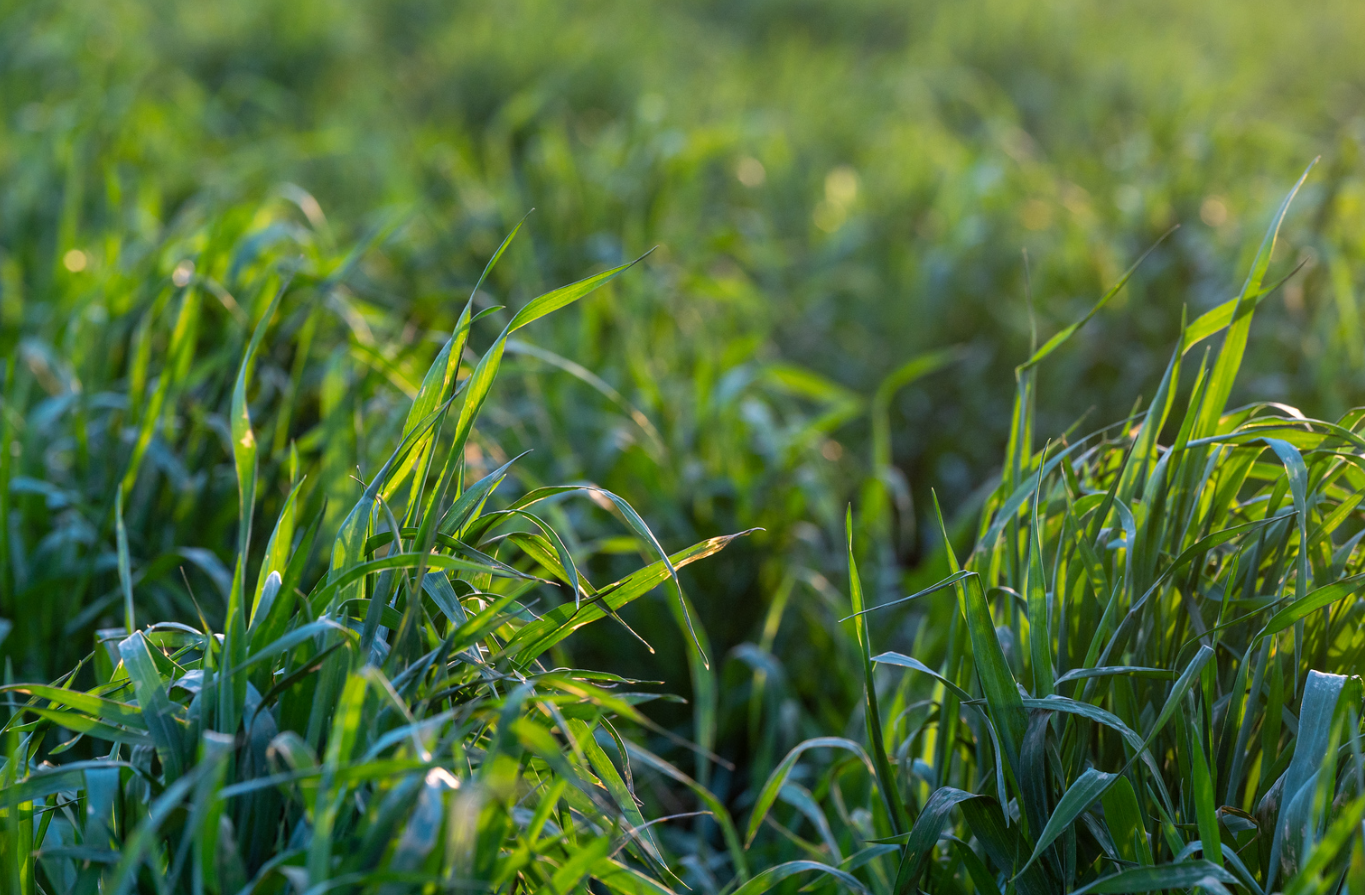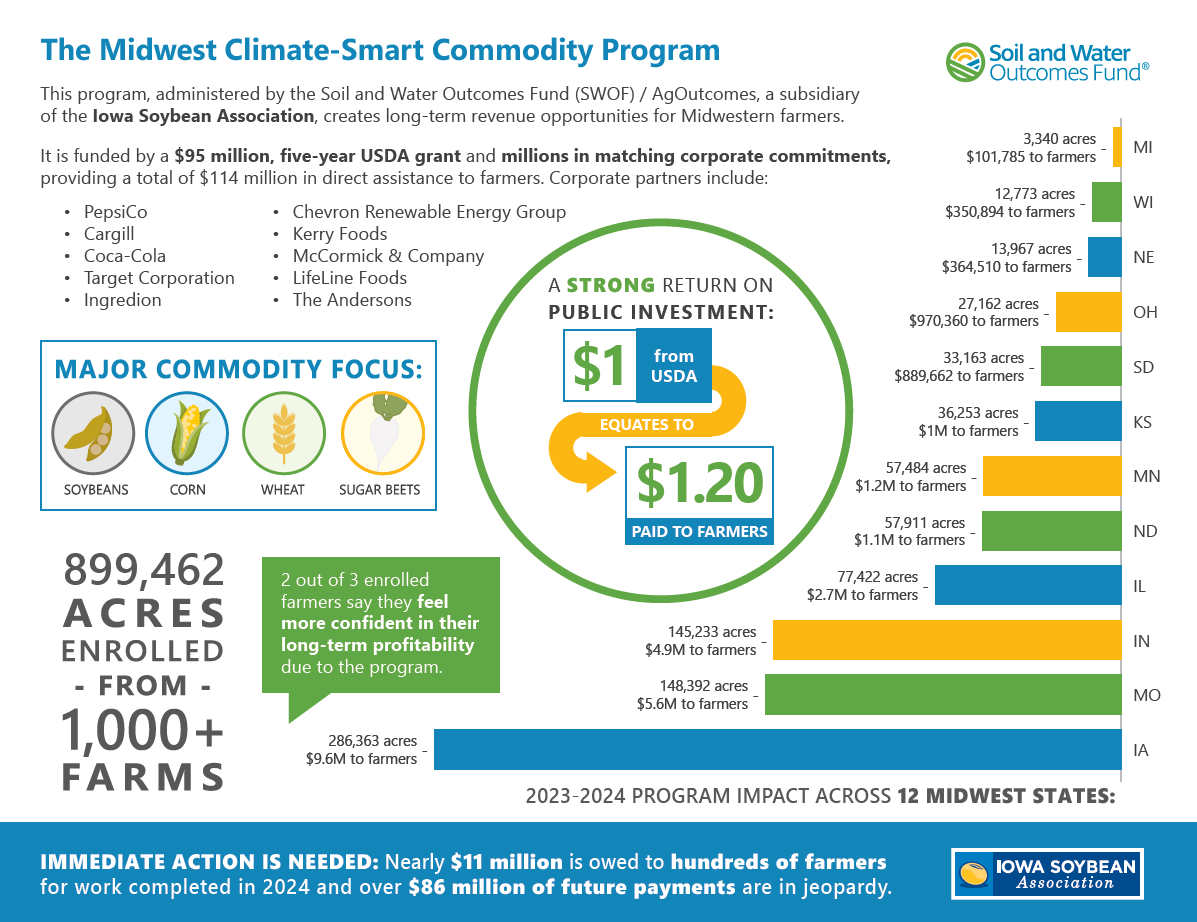
(Photo: Iowa Soybean Association / File Photo)
Farmer-led efforts impacted by pause in Climate-Smart Commodity Program
February 6, 2025 | Aaron Putze, APR
The Iowa Soybean Association (ISA) was named in 2022 as a recipient of a Midwest Climate Smart Commodity grant courtesy of the U.S. Department of Agriculture (USDA).
The five-year agreement was announced by then-USDA Secretary Tom Vilsack during a news conference held at the Farm Progress Show near Boone, Iowa.
Matched by funding from the private sector, funding is dedicated to building new markets and generating new revenue opportunities for farmers implementing practices improving soil and water quality.
Led by the ISA and delivered through its subsidiary, the Soil and Water Outcomes Fund, the program supports farmers in 12 Midwest states, with the greatest participation from Iowa farmers.

Proven and effective
“In its first two years, the Midwest Climate Smart Commodity Program has proven to be one of the most effective and efficient public-private partnerships for delivering material economic and agronomic benefits to Midwestern farmers,” says ISA President Brent Swart of Spencer. “It has exceeded every goal to date.”
The program’s impact includes:
- Nearly 900,000 acres of conservation practices enrolled across 12 states.
- Of that total, almost 300,000 acres have been enrolled in Iowa.
- Almost 600,000 acres have been enrolled across Illinois, Indiana, Kansas, Michigan, Minnesota, Missouri, Nebraska, North Dakota, Ohio, South Dakota and Wisconsin.
- More than 1,000 participating farms producing corn, soybeans, wheat and sugar beets in the 12 states.
- Average farmer payment of $33 per acre.
- 95+% reenrollment rate from 2023 to 2024.
- Quantified co-benefits include reductions in soil erosion and in nitrogen and phosphorus runoff, and improvements in soil health and organic matter, water retention and drainage.
As a model for efficiency, the program leverages federal investment to drive private-sector engagement. For every $1 contributed by USDA, the program pays farmers $1.20, demonstrating a strong return on public investment. The total farmer payments over the project are expected to be $114 million.
The program has succeeded in developing new revenue streams for farmers, securing partnerships from major companies sourcing commodities from Iowa and the 11 other program states.
These market-based revenue streams, says Swart, align with company supply sheds and sourcing volumes and support farmer adoption of voluntary practices that improve the economic health and long-term viability of Midwestern farms.
Farmer payments jeopardized
Despite a signed five-year agreement between the USDA and ISA, all farmer and program reimbursements have been arbitrarily suspended.
“USDA’s suspension puts the program and its participating farmers at risk,” says Swart.
Without reimbursement, participating farmers who are contractually owed $11 million for practices implemented in 2024 will lose the investment they made in equipment and operations to implement new practices.
Examples include:
- Woodbury County: 990-acre corn and soybean farmer chose to add cover crops and reduced tillage in the operation because of their participation in the program. Owed $21,800.
- Cass County: 836-acre corn and soybean farmer chose to convert to no-till because of program participation. Owed $14,700.
- Jasper County: 319-acre corn and soybean farmer chose to add cover crops and convert to no-till because of their participation in the program. Owed $5,600.
- Clayton County: 1,247 acres corn and soybean farmer chose to switch to no-till and add cover crops. Owed $22,700.
“Lack of timely reimbursement jeopardizes ISA’s ability to meet its program obligations and fulfill its goal of building new long-term, viable revenue opportunities for Midwestern farms,” says Swart.
In a letter distributed to Iowa’s Congressional delegation this week, Swart says all involved in the program appreciate the need for fiscal discipline and efficiency.
“We ask for your support in advocating USDA honor its contractual obligation to ISA and its commitment to Midwestern farmers.”
Swart says ISA welcomes the opportunity to discuss options for renewing the program’s payments to farmers and secure ongoing USDA support for this critical program.
For more information, visit theoutcomesfund.com.
Back